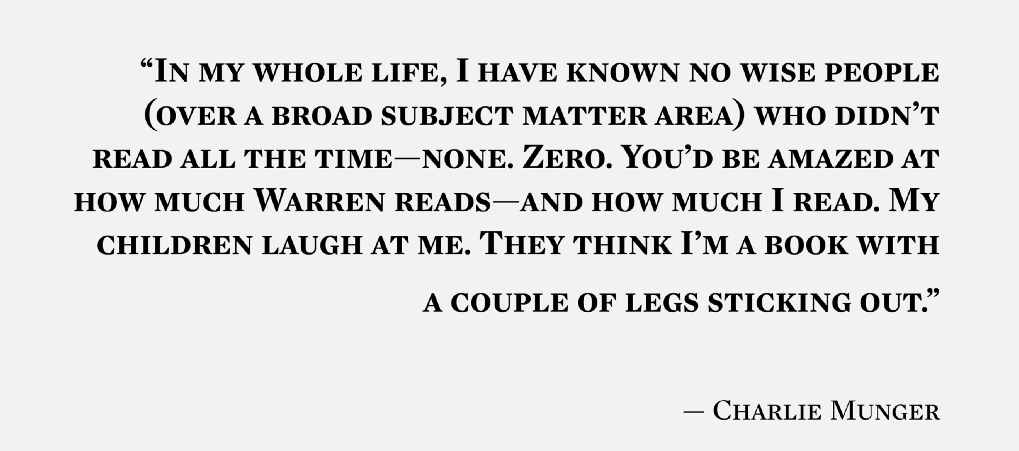“The goal of the non-professional should not be to pick winners – neither he nor his “helpers” can do that – but should rather be to own a cross-section of businesses that in aggregate are bound to do well. A low-cost S&P 500 index fund will achieve this goal.” — Warren Buffett, 2013 Letter to Berkshire Hathaway shareholders
As Albert Einstein wisely stated, compound interest is the eighth wonder of the world: He who understands it earns it while he who doesn’t pay it. The vast majority of individuals who take the initiative to accumulate savings should follow Warren Buffett’s advice on using index funds and dollar cost averaging to achieve satisfactory returns over time. For those earning at or above the median wage in the United States, it would be very difficult to end up poor if one simply saves ten to fifteen percent of gross income and dollar cost averages into the S&P 500 over several decades.
But what about non-professional individual investors who want to achieve better than average results? In the short run, the stock market resembles a manic-depressive character who bids up prices one day and sends them down the following day without much of a reason for the change in sentiment. Benjamin Graham’s “Mr. Market” character perfectly personifies the psychology of financial markets in the short run.
Continue Reading →

Born in 1877, Jesse Livermore is possibly the most famous trader in history.
He started trading at the age of 14 from bucket shops. His tape reading skill was so good that these bucket shops eventually didn’t want to do business with him.
At his peak in 1929, he was worth $100 million. Ultimately, he lost his entire fortune when he broke his trading rules.
The same trading rules which made him millions, caused him to lose everything when he lost control of himself.
Still, there are valuable lessons to be learned from Jesse Livermore’s trading experience.
Continue Reading →

We recently came across Philip Fisher’s checklist for investing in stocks in Common Stocks and Uncommon Profits and Other Writings and thought it was worth reproducing here. Fisher was one of the most famous investors in his story. As his son, Kenneth (renowned as an investor in his right) wrote in his obituary: “Among the pioneer, formative thinkers in the growth stock school of investing, [Philip] may have been the last professional witnessing the 1929 crash to go on to become a big name. His career spanned 74 years, but was more diverse than growth stock picking. For decades, big names in investing claimed Dad as a mentor, role model and inspiration.”
15 Points to Look for in a Common Stock
Continue Reading →
Maybe you also followed this story. Or maybe not. But basically a really big hedge fund manager, one of those guys who people quote and probably talk about at Harvard Business School, placed a super big bet on this company called Valeant.
Valeant is a pharmaceutical company trying to cure problems with skin and infectious diseases. They actually also own Bausch Lomb so that means they have a giant eye care business.
This hedge fund manager made a bet that Valeant would keep growing their business, diversifying, and acquiring. He once even called them the next “Berkshire Hathaway.”
This thesis turned out to be wrong. Like really wrong. The company crashed. People started to call Valeant out for jacking up the prices of their drugs. They also were apparently doing some dicey bookkeeping things. Just Google “Philidor Valeant scandal” if you want to learn more about that.
Continue Reading →
Emotions aren’t always your friend when it comes to investing. In fact, they can lead to trouble in some very specific ways…
Here’s today’s understatement of the year: emotion plays a major role in investing.
Whether it’s the gold rush leading to 2008’s crash, momentum trends that cause a stock to orbit its true value or the irrational exuberance of the 1990s, the stock market is filled with people who act like, well… human beings. Perhaps unsurprisingly, this has its strongest expression when it comes to individual investors.
That’s not always bad. Emotions come into any big decision, and it’s important to feel good about your portfolio. Emotions dictate risk tolerance, after all. The same goes for picking companies with a strong sense of mission. Those are the decisions that help you sleep at night.
The problems start when emotions become biases. That’s when you, as an investor, can make bad choices that don’t leave you personally or financially any better off. What do those biases look like? Here are the top ten to keep an eye out for the next time you open up the portfolio…
10. Overconfidence
Bias: Focusing on an actual or perceived expertise on a narrow slice of the market
Overconfidence isn’t necessarily what it sounds like. Yes, sometimes this bias is caused by an investor who knows less than he thinks. That guy who caught 15 minutes of “Mad Money” and then gives lectures at a dinner party is a classic example.
Continue Reading →
Listen to this article
Markets are at the whim of shocks and surprises. No doubt that last year’s surprising Brexit referendum result and Trump’s impressive presidential election win remind us of that. When it comes to taking risks, humans are not (necessarily) equipped to deal with the rollercoaster world of risks and investing in a level-headed way.
Humans Can Be Their Own Worst Enemies
Continue Reading →

That quote kickstarted my own reading habits and helps me regularly read over 100 books a year.
Charlie Munger is the billionaire business partner of Warren Buffett and the Vice Chairman at Berkshire Hathaway, one of the largest companies in the world. He’s also one of the smartest people on the planet — his lecture on the psychology of human misjudgment is the best 45 minutes you might spend this year.
Over the years Munger’s compiled a list of book recommendations that has served me well. A lot of these books will help you become more valuable by seeing the world for what it really is and gaining unique ideas and insights.
1. Faraday, Maxwell, and the Electromagnetic Field: How Two Men Revolutionized Physics
It’s a combination of scientific biography and explanation of the physics, particularly relating to electricity. It’s just the best book of its kind I have ever read, and I just hugely enjoyed it. Couldn’t put it down. It was a fabulous human achievement. And neither of the writers is a physicist.
Continue Reading →
Hmm … When WAS the best time to invest you mean?
Well, the day your dad was born if you had money … this is circa 1959 .. or when your grandfather died …. or … but hey since we did not do any of those things, it has to be today.
It’s not surprising that first-time investors often worry about the timing of their initial share purchases. When you follow stories which keep saying “market is up” or ‘Market is Going down” this has to happen! It looks like you have started at the wrong point in the market’s ups and downs and it can leave you with losses even before you reach the batting crease!
But relax kiddos: Whenever you first invest, time is on your side. So the kid who started at 22 is smarter than the kid who waited till he / she turned 32. In the long run, the compound returns of a smart investment will all add up nicely. How the market was when you began will not matter if you do a sip.
Start Now!
That is what is important! Instead of wondering about when you should make that first share / mutual fund purchase, think instead about how long you will stay invested. If you are 22 years of age, you will stay invested for say 50/60 years! Different investments offer varying degrees of risk and return, and each is best suited for a different investing time perspective. In general, debt instruments like bond funds/ bank fixed deposits, etc. offer lower, more assured returns for investors with shorter time frames (say 24 months). Historically, short-term Treasury bills yielded roughly 5% per year. Savings bank gives you about 3% p.a. taxable. With inflation at 7% these rates may or may not attract you.
Longer-term government bonds like the 10-year gilt can provide higher returns – say 8% p.a. These returns could be stable only in the short run. In the long run even these bonds could be volatile.
Shares have also been very good to sensible and patient investors. Overall, the BSE’s Sensex has returned an average of 19.4% per year from 1979 to 2017 — way ahead of debt instruments. The range of the returns for stocks OBVIOUSLY much larger than the range for debt instruments over the same period. Stocks suffered a decline in 1993 – of 42%, but this was obviously the outcome of an amazing 1992 of about 241% !! It enjoyed several particularly strong years of course, and the period 2002 to 2007 took the cake when the market went up 7x in 4 years!
How long will you stay invested?
The more the time that you have to create wealth, the greater risk you can accept. This comes from having a good income, and ability to save money. And since you’ll have more time to wait out periods of bad returns you SHOULD stay cool.
If you need the money within the next five years, you should put say 70% of your money in bonds and only about 30% in shares. If you need the money within the next three years, you should also avoid long bond mutual funds – you are better off investing in bond funds with duration of 3/4 years. The lesser time you plan to be invested, the less you can afford to lose. On the other hand, shares are an attractive option for long-term goals like children’s education, long term and retirement. The higher returns are simply too good to ignore because you do not understand. Take time to learn it!
Follow us on Twitter, Facebook, Instagram, Pinterest, Google+
The original post appears on www.subramoney.com and is available here.

Owing to its irrational nature, people often assume that investing in the stock market is a rather difficult affair. Many even compare it to gambling and consider it impossible. With the amount of negative opinions regarding the stock market, it seems like a place where everybody loses. We have to set the record straight, once and for all.
Investing is not rocket science and investing in the stock market is relatively easy to manage if you do it the right way. Your mindset is the one stopping you from investing and it will be the one that will help you invest. Everyone has their own opinions about the market and a lot of people make it difficult for themselves, more than necessary.
Continue Reading →
Investors are often cautioned about investment risk, market risk, etc. by their advisors and brokers. Investing in a particular asset or any equity share in particular, can give back good returns or, on the contrary, even wipe out the basic value of money that you have put in. But did anyone tell you that the broker himself can also cheat you? He can go bankrupt or be a fraud?
Not only have the small ones, but big investment firms have also given their clients a nightmare. If viewed from the brokerage company’s perspective, it is doing a business purely. Profits are their primary motto. And your money, except from the brokerage charges, is a secondary element for them.
So, how can a stock broker deceive you?
Continue Reading →










